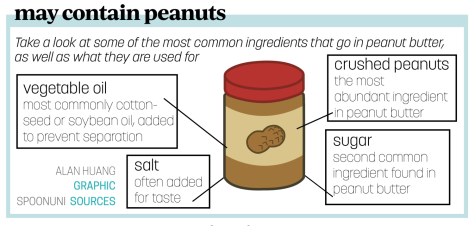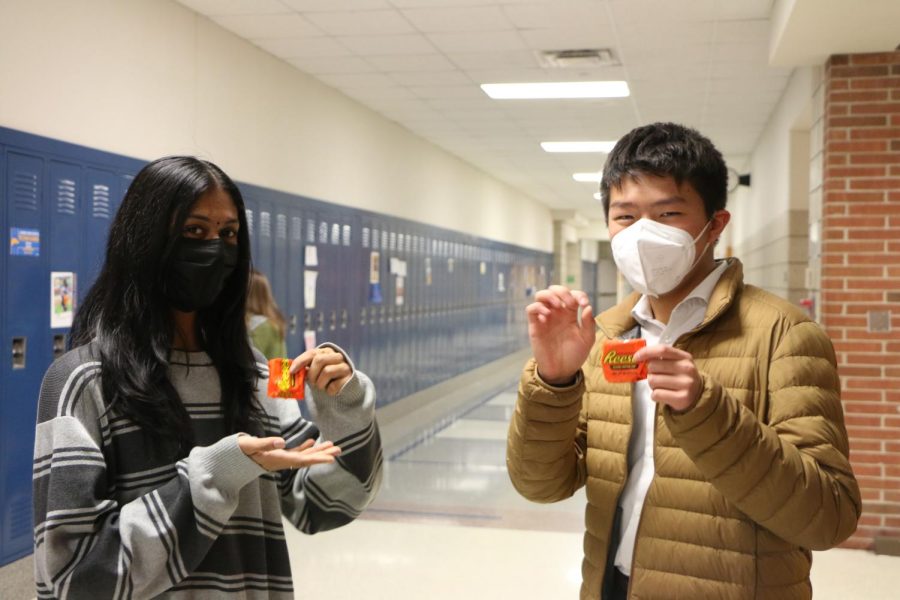The wafting scent of peanut butter cookies fills the air as sophomore Kevin Hu walks down the crowded hallway with a closed cookie box in his hands. He hands the box to his friend, sophomore Roohi Sanka, who smiles at the sight of the cookie she had wanted all week. But Hu has been careful handling the treat because while Sanka said she is a peanut butter enthusiast, Hu is part of the 0.03% of students at this school who have a peanut allergy.
“During an allergic reaction, first, my throat starts to get itchy, and then I’ll start throwing up. Even if I’ve thrown up everything that I’ve eaten already, I’ll still throw up and try to get it out of my system. I might get hives on my face, but that’s usually the extent of it,” Hu said.
According to the American College of Allergy, Asthma & Immunology (ACAAI), the number of children with peanut allergies in the United States has increased 21% since 2010. The severity of allergic reactions can range from Hu’s symptoms, like hives and vomiting, to anaphylaxis, a life-threatening condition that can lead to unconsciousness.

Still, despite Hu’s allergy and Sanka’s love for peanuts, Hu said it has not been an obstacle in their friendship. He said his allergic reactions stem from direct contact with peanuts rather than cross-contact or inhalation, which allows him to handle packaged peanut goods.
“There are definitely times where there’s something she would want me to try but I can’t because of my allergy, but I think peanuts have actually benefited our friendship” Hu said. “I’m aware that she likes peanuts so much and my peanut allergy has become less severe as I’ve gotten older, so it makes a really easy gift when I want to give her Reese’s or something packaged in a box. She usually appreciates it a little more.”
Regardless of the severity of Hu’s allergy, Sanka said she hopes he would be more careful.
“I was definitely really happy (that he got me) a peanut butter cookie, but I also thought that he was being a little careless with his allergy. Another time, he got me Reese’s and he put it in his pocket but it melted. That’s stupid of him because he (could’ve got an allergic) reaction,” Sanka said.
Amy Fletchall, registered nurse (RN) at this school, said friends like Hu and Sanka should take necessary precautions to prevent accidental contact with peanuts and understand how severe someone’s allergy is.
“There’s nothing that should keep people with peanut allergies from being friends with people without peanut allergies. It’s just a matter of taking precautions,” Fletchall said. “If students have problems with even contact with somebody who’s eaten peanuts, then they just need to make sure that that person has washed their hands.”
Sanka said she agreed with Fletchall and said she makes sure to be wary of when she has peanut products around Hu.
Ultimately, in light of National Peanut Month which takes place in March, Hu said other people don’t need to act differently around him but should be cautious around those with more severe peanut allergies.
“If you’re around someone with a really bad peanut allergy, be respectful towards their allergy. If you want to have peanuts, wait until they’re gone or go to another room to have them,” Hu said. “But otherwise, if your allergy isn’t that bad, it can be sort of like a bonding tool like it is with me and Roohi.”




























![Keep the New Gloves: Fighter Safety Is Non-Negotiable [opinion]](https://hilite.org/wp-content/uploads/2024/12/ufcglovescolumncover-1200x471.png)






!["Wicked" poster controversy sparks a debate about the importance of accuracy versus artistic freedom [opinion]](https://hilite.org/wp-content/uploads/2024/11/riva-perspective-cover-1200x471.jpg)









































![Review: “We Live in Time” leaves you wanting more [MUSE]](https://hilite.org/wp-content/uploads/2024/12/IMG_6358.jpg)
![Review: The premise of "Culinary Class Wars" is refreshingly unique and deserving of more attention [MUSE]](https://hilite.org/wp-content/uploads/2024/12/MUSE-class-wars-cover-2.png)
![Introducing: "The Muses Who Stole Christmas," a collection of reviews for you to follow through winter [MUSE]](https://hilite.org/wp-content/uploads/2024/12/winter-muse-4.gif)
![Review: "Meet Me Next Christmas" is a cheesy and predictable watch, but it was worth every minute [MUSE]](https://hilite.org/wp-content/uploads/2024/11/AAAAQVfRG2gwEuLhXTGm3856HuX2MTNs31Ok7fGgIVCoZbyeugVs1F4DZs-DgP0XadTDrnXHlbQo4DerjRXand9H1JKPM06cENmLl2RsINud2DMqIHzpXFS2n4zOkL3dr5m5i0nIVb3Cu3ataT_W2zGeDAJNd_E-1200x884.jpg)
![Review: "Gilmore Girls", the perfect fall show [MUSE]](https://hilite.org/wp-content/uploads/2024/11/gilmore-girls.png)
![Review in Print: Maripaz Villar brings a delightfully unique style to the world of WEBTOON [MUSE]](https://hilite.org/wp-content/uploads/2023/12/maripazcover-1200x960.jpg)
![Review: “The Sword of Kaigen” is a masterpiece [MUSE]](https://hilite.org/wp-content/uploads/2023/11/Screenshot-2023-11-26-201051.png)
![Review: Gateron Oil Kings, great linear switches, okay price [MUSE]](https://hilite.org/wp-content/uploads/2023/11/Screenshot-2023-11-26-200553.png)
![Review: “A Haunting in Venice” is a significant improvement from other Agatha Christie adaptations [MUSE]](https://hilite.org/wp-content/uploads/2023/11/e7ee2938a6d422669771bce6d8088521.jpg)
![Review: A Thanksgiving story from elementary school, still just as interesting [MUSE]](https://hilite.org/wp-content/uploads/2023/11/Screenshot-2023-11-26-195514-987x1200.png)
![Review: "When I Fly Towards You", cute, uplifting youth drama [MUSE]](https://hilite.org/wp-content/uploads/2023/09/When-I-Fly-Towards-You-Chinese-drama.png)
![Postcards from Muse: Hawaii Travel Diary [MUSE]](https://hilite.org/wp-content/uploads/2023/09/My-project-1-1200x1200.jpg)
![Review: "Ladybug & Cat Noir: The Movie," departure from original show [MUSE]](https://hilite.org/wp-content/uploads/2023/09/Ladybug__Cat_Noir_-_The_Movie_poster.jpg)
![Review in Print: "Hidden Love" is the cute, uplifting drama everyone needs [MUSE]](https://hilite.org/wp-content/uploads/2023/09/hiddenlovecover-e1693597208225-1030x1200.png)
![Review in Print: "Heartstopper" is the heartwarming queer romance we all need [MUSE]](https://hilite.org/wp-content/uploads/2023/08/museheartstoppercover-1200x654.png)




